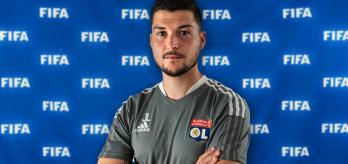Dean Santangelo is a goalkeeping coach at the Swiss football club, FC Zürich. He leads the goalkeeping staff from those managing the U18s down to the U12s and is also heavily involved with the U21s which is FC Zürich’s reserve team. A big part of his job is to coordinate the daily routines of his goalkeepers. In this video Santangelo gives an informative overview into how he continues developing the methodology used week in week out to get the very best results from his coaches and goalkeepers.
Some of Santangelo’s key competencies for a goalkeeping coach include:
-
Having time available to be in contact with their goalkeepers 24/7;
-
Acting as a personal coach, passing on wisdom, knowledge and expertise;
-
Showing patience in the development of the younger goalkeepers;
-
Knowing what the older goalkeepers need and how to manage them with different training methods.
Watch interview
Read Sumary
Part 1: Santangelo’s role and goalkeeper development
In the first part of the interview, Santangelo explains what his role is and his key responsibilities. He goes on to discuss how he supports his goalkeeping coaches in their development. He believes the best way to develop a goalkeeper is to also develop the coach because as football keeps on developing, the coaches have to keep on developing as well, rather than standing still. He continues by examining how he structures the development of goalkeepers, differentiating between the younger and older age groups. With the young goalkeepers, for example, they begin with analytical work and then they work with more specific game situations as they move through the age groups.
Part 2: Young goalkeeper characteristics and analytical training techniques
In the second part of the interview, Santangelo describes the abilities he looks for in young goalkeepers. He assesses their technical, tactical, mental and physical strength. He explains how they need to stay calm under pressure and to be reactive to rapidly changing game situations. He discusses how he coordinates the physical development of goalkeepers where they are exposed to working on speed and general strength. He also shares with us how he uses video analysis in his work and how exercise libraries are built for goalkeeping coaches.
Part 3: Managing the transition from youth football to senior level
In the final section, Santangelo considers the other support networks for his players, including the first team coach, a talent manager, parents, psychologists and mentor coaches if needed. He reminds us that goalkeeping coaches are also personal coaches who will offer support when any issues arise. Santangelo then contemplates the transition from youth to senior football. He explains that it is something very individual and a plan cannot be set to say that a goalkeeper at the age of 17 or 18 can make this next step. For some goalkeepers, they might be involved in some first team training, whilst for others it might mean loaning them out to a lower division team to gain match-time to develop on the pitch.



.variant64x64.JPG)











.variant348x164.JPG)



















